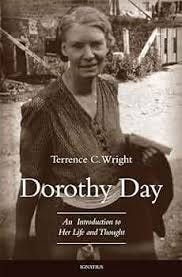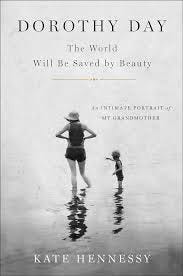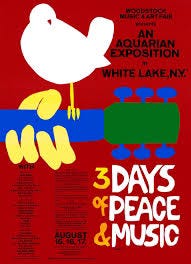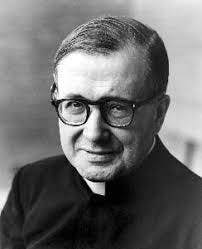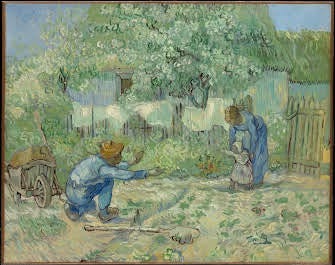The Worker and the Work
Dorothy Day and Josemaria Escriva
The last figure I covered in my class “Great Catholic Figures” (which the seminarians thought would be a great name for a Catholic gym) was Servant of God Dorothy Day. I had been struck years ago by Terry Wright’s book on Dorothy and thought it would be a great way to end the class. Also, the seminarians do a “poverty immersion” at the end of their Spirituality Year, and of course Dorothy Day was a great lover of voluntary poverty and of the poor.
This interest in Day led me to another book about the woman on the way to canonization: Kate Hennessy’s Dorothy Day: The World Will Be Saved by Beauty (An Intimate Portrait of My Grandmother). Hennessy is an amazing writer and gives an intense, close-up view on Dorothy Day and especially on Day’s relationship with her daughter Tamar. Kate is the youngest of Tamar’s children, and the story of their family is heart-breaking and beautiful. The book really moved me.
As I read the story of Dorothy Day and the Catholic Worker, the movement and the newspaper which she founded along with Peter Maurin, I am particularly struck by the chaos of the life and the work. Dorothy did not want to hand out food and clothing to the poor from a “safe” distance. Instead, she and the Workers who joined her lived alongside those who were in need, got to know them in the intimate and very messy details of their life. In fact, the goal was that they would no longer be “they” anymore, but members of a family, of a “we.” This ability to welcome the stranger, one of the corporal works of mercy, also lived in a unique way in Tamar, Dorothy’s daughter, even though Tamar followed a different path than her mother.
To welcome the stranger—and not to make any demands on him or her. This is what struck me again and again about Dorothy’s mission, and I have to admit, I was quite scandalized. Dorothy rarely forced her faith or her way of doing things on anyone. The “family resemblance” of the Catholic Worker family, it seems from an outside observer, is the insistence that each person has a path and a vocation that is unique. This could often look very strange to an outsider, especially to one who, like me, craves order in life. The Catholic Worker, seen from Hennessy’s perspective, does not provide pre-packaged order.
Two examples, from the book and from my own encounter with Catholic Worker folks, highlight this. In those wild 1960s, the Catholic Worker farm in Tivoli, New York was marked by drug use and promiscuous sex. Dorothy was, of course, upset about this but was not able to put a stop to it. She supported her own grandchildren when they set off for the Woodstock festival in 1969. The non-conformity of those years reminded her of her own youth, when in the 1920s she led a life of searching that eventually led her to the Catholic Church.
And so she prayed and proposed and corrected, even when chaos reigned around her. The other example comes from an encounter I had at Andre House, a Catholic Worker house of hospitality in Phoenix, in the early 2000s. One of the Workers joked about a saying around Catholic Worker circles: “We are not very Catholic and we don’t work very hard.” Temperamentally, this drove me crazy! Can God really work through all this craziness??!!
Which brings me to the second half of my title. Around the same time that Dorothy Day (1897-1980) was starting her movement, another Catholic movement was beginning in Spain. Opus Dei, which translates “The Work of God,” was founded by Saint Josemaria Escriva (1902-1975). It is sometimes referred to simply as “The Work.” The word “work” ties him to the very different movement that Dorothy Day founded. Josemaria say that the world of work could be sanctified, could be a place of encounter with God, and that work could be done for the glory of God. The Church’s social teaching, which also inspired Dorothy Day, led Saint Josemaria to describe a spirituality of work that has inspired many since his vision of worker-saints in 1928.
While the Catholic Worker could be described by the words “messy” and “chaotic,” Opus Dei is characterized by order, precision, and cleanliness, at least in my outsider perspective. A story about Saint John Paul II goes that once, on his birthday, they brought out a cake that was done to perfection. He quipped, “I see Opus Dei has provided the cake for my birthday!” I had a chance to know a few professors and students associated with Opus Dei while I was at the University of Dallas. I was so impressed by the hard work and the competence they displayed in all they did. And of course, I am not blind to the fact that their lives included messiness as well. But the contrasts between Dorothy and Josemaria, and between their movements, are clear to any observer.
The point of this reflection is not to say simply that I prefer one approach rather than the other. The point is also not to say something trite like “it takes all kinds,” although I believe that it does. There are fierce disagreements between the way the Catholic Worker does things and the way Opus Dei does things. Our temptation in these times is to say that one of these ways is Catholic and the other is not. And yet, the founders of both of these movements are held up as shining lights in the Church. I have received a lot from both of these Catholics.
Rather, the inspiration for this article comes from the desire not to be an outside observer of movements and saints in the Church. As I read Hennessy’s book on Dorothy, I was moved to move. Catholicism is not a spectator sport, because life is not a spectator sport. How easy it is to write or to think about the life of the Church as something happening “over there” to “those people.” Yet Dorothy’s life is compelling—it compels, it moves, it forces one to take action. This action could be to enter a cloistered monastery. This action could be to protest nuclear war. This action could be to make the best damn birthday cake ever. But, for God’s sake, we cannot just think about being Catholic!
How often in my life I have just wanted to stand on the sidelines—or to use an Arizona image, as the weather gets hotter, on the edge of the pool. I have been afraid to get dirty or to get wet or to make a mess. Dorothy compels me to dive in. Josemaria compels me to dive in. The saints compel us to dive in.
And this does not mean that there are no standards. The Catholic faith is the standard, but the Catholic faith cannot just be something we think about or talk about, or (irony!) blog about. Life must be lived! And the only way to judge as a Catholic is to implicate yourself in action, or as Father Giussani says, to “surprise yourself in action.” I am happy that there are fierce disagreements between the two visions of work, but they only make sense when one is committed, when one is swimming in the pool. Otherwise, the disagreements are only theoretical and ideological.
In this way, two people who disagree strongly at the theoretical level about what should be done, or how one should work, can meet each other at the root. What strikes me about Dorothy and Josemaria is that we can recognize in both of them the root, that is, we can see that they are both radicals. (Radix in Latin means root…)
I too want to do something radical for Jesus. Could I make a mistake? Yes! But that is not a problem if we believe in a God who is Father, with his arms outstretched toward his child who is just learning to walk.
I guess this is so important to me because I find myself admiring the decisiveness and the radical-ness of the Catholic Worker and Opus Dei. I find in myself both the lover of order and the hippie. And I can spend way too much time thinking about which one I am “supposed” to be. But true holiness would be just to be myself, in Christ. That Christ who plays to the Father in “ten thousand places” (Gerard Manley Hopkins) “through the features of men’s faces.” So, what I am learning from Dorothy and Josemaria is courage, the courage to experience for myself that belonging and freedom always go together, that I do not have to be afraid to lose my life for Christ, because only that way will I find it. To be His and to be most fully myself coincide.
And life becomes a great adventure!


